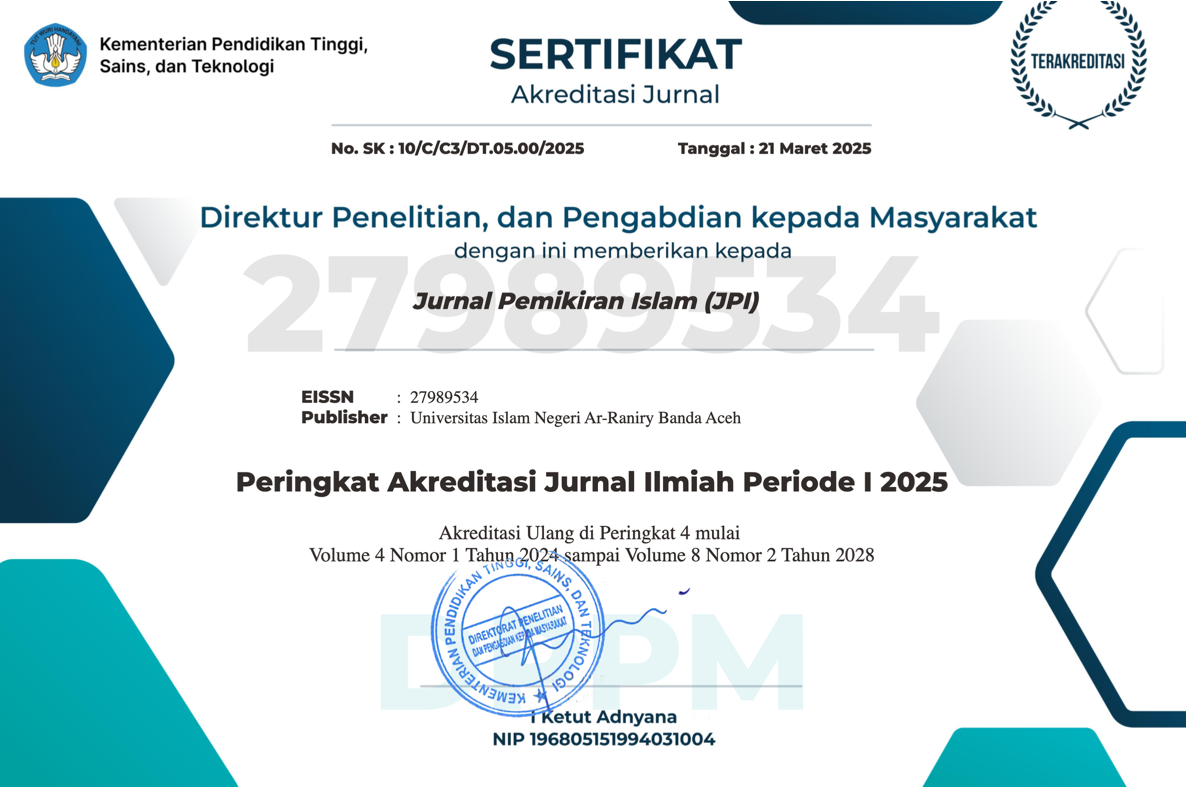Moralitas Imanuel Kant dalam Kasus Body Shaming di Media Sosial
DOI:
https://doi.org/10.22373/jpi.v3i1.17434Keywords:
Body shaming, mahasiswi, UIN Ar-Raniry, dampak psikologisAbstract
Advanced technological developments have brought significant changes to the systems of thinking and life of society. This creates an unhealthy perception of comparison in social media and real life, resulting in body shaming against those who do not meet those criteria, especially among UIN Ar-Raniry students. Body shaming is generally experienced by women, as they are often the object of judgment based on physical appearance. This criterion of beauty is considered knowledge acquired through experience, which forces women to meet such criteria. This is clearly contrary to the human rights principle that every individual has the same value, regardless of physical appearance. This study uses qualitative and descriptive methods. The results show that body shaming is a crime that is invisible but has a real impact on the lives of the victims, such as the emergence of introverted feelings, self-insecurity, overthinking, and high levels of stress. Therefore, body shaming is an unjustifiable act from a social, shariah, and moral point of view.
Perkembangan teknologi yang maju telah membawa perubahan signifikan dalam sistem berpikir dan kehidupan masyarakat. Hal ini menciptakan persepsi perbandingan yang tidak sehat dalam media sosial dan kehidupan nyata, yang mengakibatkan perlakuan Body shaming terhadap mereka yang tidak memenuhi kriteria tersebut, terutama di kalangan mahasiswi UIN Ar-Raniry. Body shaming umumnya dialami oleh perempuan, karena mereka sering kali dijadikan objek penilaian berdasarkan penampilan fisik. Kriteria kecantikan ini dianggap sebagai pengetahuan yang diperoleh melalui pengalaman, yang memaksa perempuan untuk memenuhi kriteria tersebut. Hal ini jelas bertentangan dengan prinsip HAM bahwa setiap individu memiliki nilai yang sama, terlepas dari penampilan fisik. Penelitian ini menggunakan metode deskriptif kualitatif. Hasil penelitian menunjukkan bahwa Body shaming adalah kejahatan yang tidak terlihat namun memiliki dampak nyata dalam kehidupan korban, seperti timbulnya perasaan introvert, ketidakamanan diri, berlebihan berpikir, dan tingkat stres yang tinggi. Oleh karena itu Body shaming adalah tindakan yang tidak dapat dibenarkan dari segi sosial, syariah, dan moral.
Downloads
References
Agustinus W Dewantara. 2017. Filsafat Moral. Yogyakarta: Kanisius.
Arin Maulida Aulana. 2021. “Body Shaming Dalam Al-Qur’an Perspektif Tafsir Maqasidi.” Jurnal Ilmu Al-Qur’an Dan Tafsir, 6(1), 103.
Bonita Mahmud. 2019. “Kekerasan Verbal Pada Anak.” Jurnal Annisa', 12 (2), 691–92.
Branin, Diar Sukmono. 2012. “Ekspoitasi Tubuh Perempuan Di Televisi Sebagai Ironi Kepribadian Indonesia.” Jurnal Komunikator Indonesia, 4(1), 15.
Burhanuddin Salam. 2000. Etika Induvidual Pola Dasar Filsafat Moral. Jakarta: Rineka Cipta.
Damanik. 2018. “Dinamika Psikologis Perempuan Mengalami Body Shaming.” Yogyakarta: Universitas Sanata Dharma.
Daniel Goleman. 2002. Emotional Intelligence, Terj. T. Hermaya. Jakarta: Gramedia Pustaka Utama.
Djunaidi Chongdan. 2917. Metodologi Penelitian Kualitatif. Yogyakarta: Ar-Ruz Media.
Flourensia Sapty Rahayu. 2012. “Cyberbullying Sebagai Dampak Negatif Pengunanaan Teknologi Informasi.” Jurnal Of Information Systems, 8(1), 28.
Fransiskus Sales Lega. 2014. “Martabat Manusia Perspektif Filsafat Moral Imanuel Kant.” Jurnal Pendidikan Dan Kebudayaan Missio, 7(1), 1.
H,J Paton. 1964. “Imanual Kant, Groundwork of the Metaphysic Of Morals, Translated and Analysed by H.J Paton.” Harper Torchbook, 97.
J Raz. 2001. Respect and Attachment. New York: Cambridge University Press.
Jack D. Douglas. 2002. Kekerasan Dalam Teori-Teori Kekerasan. Jakarta: Ghalia Indonesia.
K. Bertens. 2005. Etika. Jakarta: Gramedia Pustaka Utama.
Lexy J Moleong. 2002. Metodologi Penelitian Kualitatif. Bandung: Remaja Rosda Karya.
Moh. Fachri. 2015. “Kekerasan Dalam Diskursus Filsafat Moral.” Jurnal At-Turas, 2(2), 257.
Mohd Ab Malek Md Shah. 2021. “Polemik Body Shaming Di Malaysia: Suatu Analisis Awal.” Journal Of Social Science Research, 3(1), 71–73.
S.I Benn. 1988. Theory of Freedom. New York: Cambridge University Press.
Stevany Putri. 2018. “Perencangan Kampanye ‘Sizter’s Project’ Sebagai Upaya Pencegahan Body Shaming.” Jurnal DKV Adiwarna, 1(12), 2.
Suhariyanto Budi. 2012. Tindak Pidana Teknologi Informasi (Cybercrime) Urgensi Pengaturan Dan Celah Hukumnya. Jakarta: PT Raja Grafindo Persada.
Suharsimi Arikunto. 2010. Prodesur Penelitian: Suatu Pendekatan Praktek. Jakarta: Rineka Cipta.
Downloads
Published
Issue
Section
License
Authors who publish in Jurnal Pemikiran Islam agree to the following terms:
- Authors retain copyright and grant the journal right of first publication with the work simultaneously licensed Attribution-NonCommercial-ShareAlike 4.0 International (CC BY-NC-SA 4.0) that allows others to share the work with an acknowledgment of the work's authorship and initial publication in this journal.
- Authors are able to enter into separate, additional contractual arrangements for the non-exclusive distribution of the journal's published version of the work (e.g., post it to an institutional repository or publish it in a book), with an acknowledgment of its initial publication in this journal.
- Authors are permitted and encouraged to post their work online (e.g., in institutional repositories or on their website) prior to and during the submission process, as it can lead to productive exchanges, as well as earlier and greater citation of published work. (See The Effect of Open Acces)














